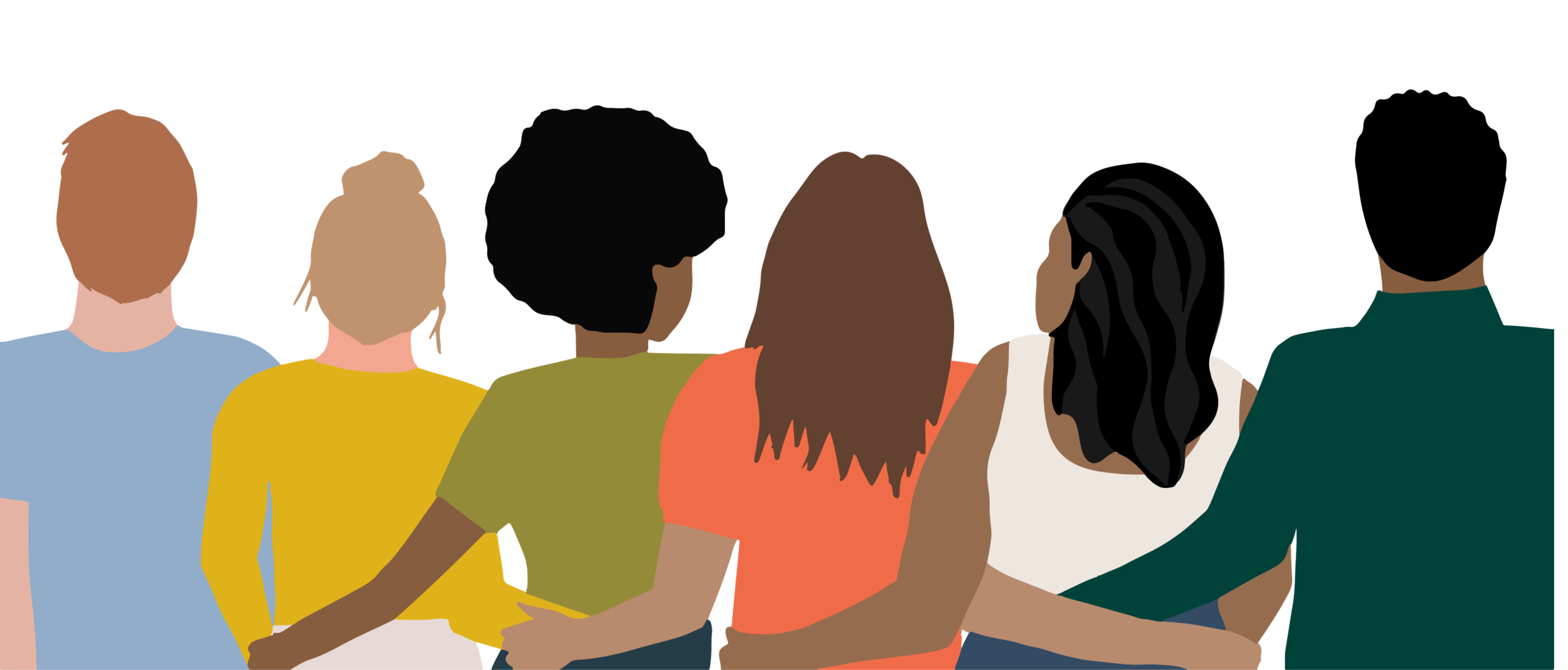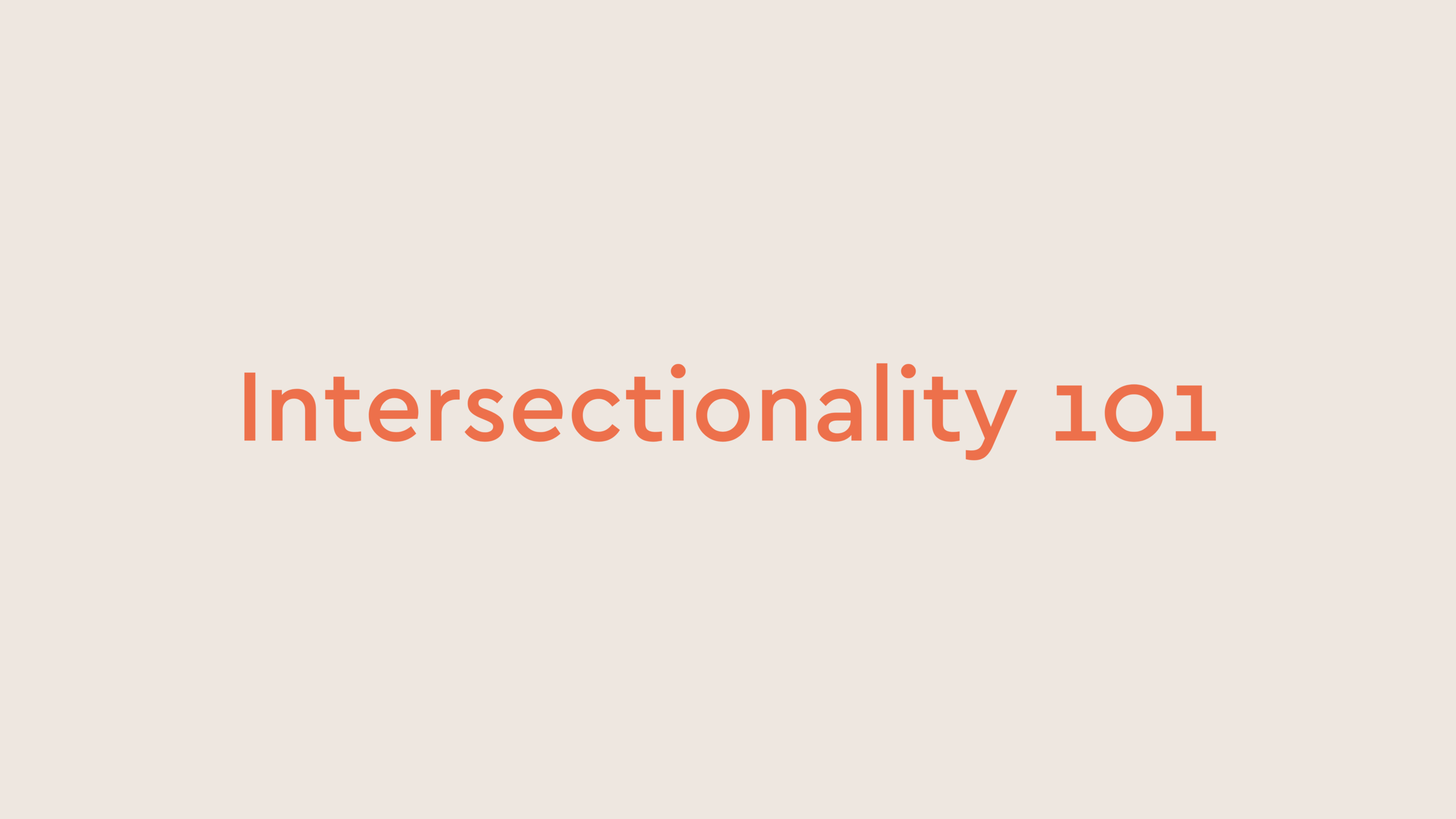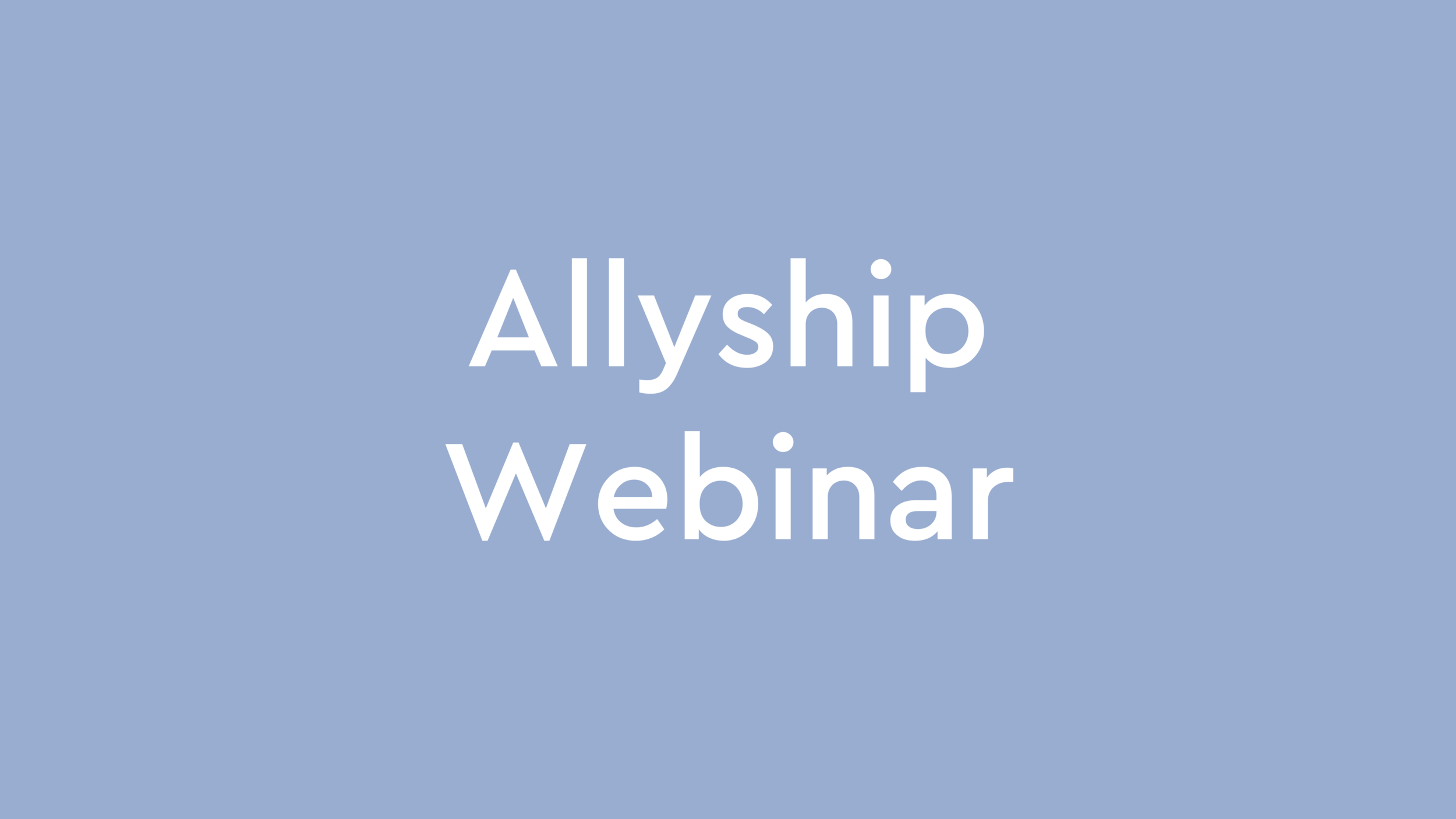Allyship
What is Allyship?
Allyship means putting our egos aside, recognizing our privilege, empathizing with others, and addressing our role in perpetuating colonialism. Our reality is determined by our social location—how we fit into the world. This is based on our socioeconomic status, our religion, our race, our ethnicity, and all other factors that contribute to how we self-identify. When we begin to accept that these factors are complex, multilayered and different for every person, it can change our interactions and offer opportunities to expand our perspectives and strive for equity. Once we have accepted what we believe to be true, we can use that knowledge to aid us on our next step to allyship.
“An ally feels a sense of responsibility to use their knowledge, skills, and position of privilege to drive tangible change” (1).
Privilege
Before reading this section, we ask that you first reflect on your privilege:
Do you find it difficult to engage in self-reflection based on your privilege? How and why?
Privilege is a word that many people struggle with. In colloquial terms, it is seen as the outcome of good luck and fortune. To further support your journey toward reconciliation, we will view the term “privilege” through an academic lens: “the [unearned] rights, advantages, and protections enjoyed by some at the expense of and beyond the rights, advantages, and protections available to others” (3). In other words, privilege is an unearned benefit that comes with identifying with certain dominant groups in society. For example, the unearned privilege that comes with being white, or a man, or identifying as heterosexual. Having privilege means fitting into the boxes that society deems as “normal”.
Social Location
Social location can be summarized as “the social position an individual holds within their society and is based upon social characteristics deemed to be important by any given society” (4), such as gender, race, age, etc. These determining factors situate us within historical, cultural and social contexts, giving some individuals with the most “desirable” characteristics inequitable opportunities. Based on our characteristics, we are assigned certain privileges, power, social roles and rules, which influence our identity and how we view the world (4). Throughout our lives, we must recognize our social locations, and how it affects our privileges.
Journaling Activity
Answer the following questions to determine your social location:
1. Gender
a) With which gender do you identify? (Male/Female/Transgender/Non-Binary/other)
b) Have you ever questioned your gender identity?
c) Do you identify with the sex you were assigned at birth?
2. Sexuality
a) Do you identify as someone that is heteronormative? If not, how do you identify?
b) Have you ever questioned your sexual identity?
3. Socioeconomic Status (social class)
a) Were you raised in a lower/middle/upper-class family?
b) What does your socioeconomic status look like now? How has it changed?
c) Have you ever experienced homelessness?
d) Have you ever lived below the poverty line?
4. Race
a) Are you white or white-passing? Are you apart of a racially marginalized group
b) Do you think about your race often?
5. Ability
a) When you leave your home, do you have to consider the accessibility of the place you are going to?
b) Have you ever been unable to attend an event because of the space it is in?
c) Do you consider yourself a person with a disability and/or free from chronic pain or illness?
6. Religion
a) Have you ever been discriminated against because of your religion?
b) Do you think about your religion often?
c) Are you ever shamed because of your religion?
d) Are you allowed time off from work for your religious holidays?
7. Geographic Location
a) What land do you reside on?
b) Do you have rights on this land?
c) Do you feel a connection to the land?
Now, practice introducing yourself using your social location. Include your name, your preferred pronouns, the land that you reside on, and any additional information that you would like people to know about you.
If you want to see an example of how to introduce yourself using your social location, take a look at our “Meet the Team” section in the toolkit!

How Privileged Are You?
Now that you have had an opportunity to determine your social location, it is time to assess the level of privilege that comes with each of these aspects of your identity. Take the Buzzfeed Quiz (5) to determine how much privilege your identities hold.
After you have completed the quiz, take a moment to consider your score. Does it surprise you? Is it what you expected? How does it make you feel? These questions are important because they allow you to become aware of your internal feelings (biases and prejudices) about your identity and the identities of others.
Before moving on to the next section, take a moment to reflect on your feelings. When you first started reading about privilege did you feel defensive? Guilty? Ashamed? That is not the purpose of these exercises! Everyone carries their privilege with them, and the point of participating in this journey is to become aware of how your identities shape your interactions with others. We know that this is a difficult concept to come to terms with. If you are still struggling with the idea of privilege, we encourage you to take a look at this article, “Why It's Important to Think About Privilege — and Why It's Hard” (6). You are not alone in your feelings, and as noted earlier, many people struggle with the idea of privilege.
Oppression
Oppression can be defined as “the prejudice and discrimination of one social group against another, backed by institutional power. Oppression occurs when one group can enforce its prejudice and discrimination throughout society because it controls the institutions. Oppression occurs at the group or macro level and goes well beyond individuals. Sexism, racism, classism, ableism, and heterosexism are specific forms of oppression” (3). Oppression can result when dominant cultural and social discourses, created by individuals in positions of power, are transmitted through social, economic and political institutions, popular culture and the media.
Understanding your privilege requires coming to terms with the effect that it has on others. In what ways do you benefit from the privilege you were born with? Now consider, who faces the consequences of that privilege?
For this section, consider racism within the legal system or the healthcare system, sexism within the patriarchy, ageism in a capitalistic society. In these scenarios, who is benefiting from the oppression of the other group? This is why it is important to “check your privilege”, as it can be unintentionally harmful to some members of society.
Intersectionality
To this point, we have talked about privilege in a way that ignores intersectionality. This is because we want you to have a deep understanding of the areas of your identity that are privileged. Now we will examine how individuals can experience both privilege and oppression simultaneously. Watch the video on Intersectionality 101 (7) that explains intersectionality to deepen your understanding.
To start, refer back to the journal activity you did about your social location. Which aspects of your identity intersect? If you are having a difficult time categorizing your identities check out the Wheel of Power and Privilege (8) an image that may help you. Are some of your identities privileged while others are oppressed? For example, maybe you identify as a white female; because you are white, you are privileged in the sense that your skin colour has not held you back from certain advancements. But, because you are a woman, you experience oppression in comparison to your male counterparts. These are intersections where your identities overlap. This is important to keep in mind as you participate in this journey because it addresses the narrative that assumes one cannot be both privileged and oppressed
Appropriation vs Appreciation
Cultural appropriation is represented as dominant members of society either knowingly or unknowingly borrowing pieces of marginalized cultures that do not belong to them (10). These pieces may include music, traditions, hairstyles, clothing, etc. “Cultural appropriation includes benefiting from another’s culture directly or indirectly and reflects an imbalance of power between different cultural groups. Appreciation is quite different. It is a process of creating healthy and positive relationships with the communities who created the culture” (10). Cultural appreciation involves learning about another culture with respect, and with the intention that it will help and acknowledge the individual who created it (10). It is important to recognize that our intention may differ from our impact when we engage with a culture that is not our own.
If you require further clarification, we encourage you to explore these resources.
Performative Allyship
“Performative activism, also called “slacktivism”, is surface-level activism. It is when a person or an organization posts on social media about a current issue, but doesn’t follow through with meaningful action. In other words, showing solidarity online for social clout, but not genuinely supporting a cause” (11). In this section, we will offer some examples to help you deepen your understanding of allyship. This is important because allyship can be harmful if it is done without intent.
For an anecdotal explanation of the potential harms of activism, listen to the podcast The Urgency of Now (12).
Remember in May of 2021, when the unmarked graves of 215 Indigenous children were found on the grounds of a residential school Kamloops? If you are unfamiliar with this discovery, here is a news article, “Grief, sorrow after discovery” (15). Think back and consider the messages that were posted on social media at that time. Now consider how authentic those messages were. Was changing a profile picture to an orange “Every Child Matters” logo enough? What was the intentionality behind sharing these posts? Was it for social clout? Was the person posting these stories an activist, taking part in change-making? When looking at stories such as this one, we need to examine them through a critical lens and ensure that we are asking these questions. Is this an example of performative allyship? Or authentic allyship?
Activity
We recognize that this toolkit focuses heavily on an Indigenous lens, and that was intentional. For this exercise, we intend to broaden the scope and to encourage you to look at examples of allyship in your everyday life.
Watch this Taylor Swift music video, “You Need to Calm Down” (16), and respond in your journal to the following questions:
Which marginalized group is represented?
What does Taylor Swift gain from her inclusivity? Do you think that is the incentive for creating this video?
Does this video feel performative, authentic or both to you? Why?
To answer this question, you may need to do some research. Does Taylor Swift act as an advocate outside of this video?
Now watch John Legend Talks On Feminism (17), and respond in your journal to the following questions:
What is he advocating for?
Do you think he is being genuine or is he motivated by self gain?
Ask yourself what is he gaining from creating this video?
Now that you have watched both videos, consider other forms of pop culture that you consume in your everyday life. Can you think of other examples of performative allyship? Can you think of celebrities who use their fame and fortune to advocate for marginalized groups? We live in an individualistic society, where intentions tend to be self-serving. Try to find a selfless example of authentic allyship in the media.
Before moving to the next section of this toolkit, brainstorm some ideas for how you can cultivate allyship at home, in your workplace, and in your daily interactions. Write these ideas in your journal and set 2 or 3 goals for yourself in the coming weeks. How will you act as an authentic ally moving forward?
Key Terms
-
“When a person of privilege works in solidarity and partnership with a marginalized group of people to help take down the systems that challenge that group's basic rights, equal access, and ability to thrive in our society” (2).
-
“Awareness of ourselves as socialized members of several intersecting groups within a particular culture in a particular time and place” (3).
-
“Refers to our systematic training into the norms of our culture; the process of learning the meanings and practices that enable us to make sense of and behave appropriately in that culture” (3).
-
“Refers to both historical and modern: “agreements made between the Government of Canada, Indigenous groups and often provinces and territories that define ongoing rights and obligations on all sides” (9).
Knowledge Sharing Series
Push past the performative into genuine, meaningful allyship. In this phase, you will examine concepts such as privilege, social location, intersectionality, and oppression.
In this interactive session, Anne Harding and Teneya Gwin led groups through a discussion on social location, navigating the complex and multilayered factors that contribute to how we self-identify. Anne and Teneya created a safe space to reflect on our position and privilege, and for us to leave feeling empowered on our journey towards allyship.




